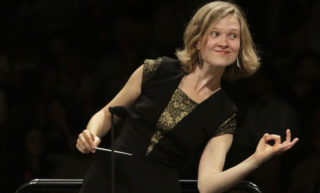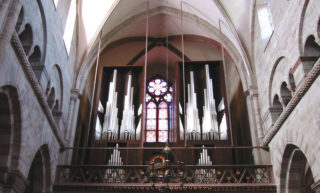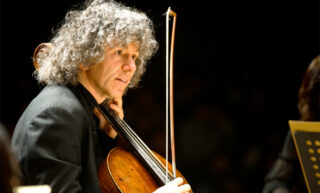Liberation
Sinfonieorchester Basel
18 and 19 May 2022
Christiane Karg, Soprano
Ivor Bolton, Conductor
Engelbert Humperdinck - Overture Die Heirat wider Willen
Gustav Mahler - Songs from Des Knaben Wunderhorn
Franz Schubert - Symphony No.8 in C major, 'The Great', D944
This month’s concert groups three compositions around the theme of liberation. Although each one offers a different interpretation, all of them place the Covid restrictions of our liberties in a new and relevant light.
In his opera Die Heirat wider Willen (The Forced Marriage) by the German composer Engelbert Humperdinck (1854 – 1921), a count and his friend are imprisoned after allegedly harassing two ladies. It is not until they reluctantly agree to marry the women and save their honor, that the men are released. Later in Madrid, when the Spanish king courts the ladies, the count and his friend, aroused by jealousy, finally embrace their own marriages.
Unlike the rather literal meaning of liberation in Humperdinck’s work, it has a different connotation in Gustav Mahler’s Lieder des Knaben Wunderhorn (Songs of the Boy’s Magic Horn). In this cycle of twelve orchestral songs, of which six are performed in this concert, people transcend from their earthly to their heavenly life leaving behind their sins and sorrows. In the song Das irdische Leben (The Earthly Life) a hungry child repeatedly asks their mother for bread, but the poor parent can only beg her child to endure: Just wait for the harvest, the threshing and finally for the baking of the bread. But by that time the child has died.
In its counterpart, Das himmlische Leben (The Heavenly Life), those that have transcended to heaven are dancing and leaping and skipping and singing under the watchful eye of Saint Peter.
Des Knaben Wonderhorn is a large collection of German folk poems brought together by Achim von Arnim and Clemens Brentano and published between 1805 and 1808. Although many of the poems aren’t original, it became a hugely popular work in the nineteenth century period of romantic nationalism. Mahler (1860-1911) set fourteen of them to music, but two eventually ended up in his second (Urlicht) and fourth symphony (Das himmlische Leben), leaving a dozen of them to form the famous cycle.
While Rheinlegendchen and Verlor’ne Müh’ are more humorous in character, Des Antonius von Padua fischpredigt is a fable-like parable on how people tend to fall back into old, bad habits. Wo die schönen Trompeten blasen (Where the Fair Trumpets Sound) forms a transition to the darker mood of Das irdische Leben. It relays the meeting of two young sweethearts just before the boy goes to war. The song ends with his haunting words: Where the fair trumpets sound [BdV: the battlefield], there is my home, my house of green grass [BdV: his grave]. A high price for being freed from sins and sorrows.
With his eighth symphony, nicknamed Die GrosseThese English program notes have been published in the magazine of the Sinfonieorchester Basel. (the Great) for its size, Schubert (1797 – 1828) finally stepped out of the shadow cast by Beethoven, thus liberating himself from the anguishing insecurity he, and many composers after him, felt of not being able to meet the standards set by the giant from Bonn. Lengthy and difficult, the work was rejected in Vienna and it wasn’t until eleven years after Schubert’s death that the symphony was premiered by the Gewandhausorchester Leipzig conducted by Mendelssohn, who supposedly said the work was “bright, fascinating and original throughout” and “without doubt one of the best works which we have lately heard”.
In the light of imprisonment, death and endlessly nagging self-doubt, the limitations of our freedoms due to Covid sometimes seem trivial.
These English program notes have been published in the magazine of the Sinfonieorchester Basel.








Comments